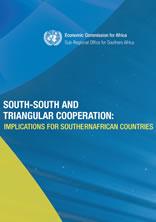South-South and Triangular Cooperation: Implications for Southern African Countries

South-South cooperation is a means of development cooperation whereby developing countries assist each other by sharing technical or economic knowledge and skills to facilitate development. It differs from bilateral exchange of knowledge, skills, resources and technical know-how by developing countries, which are often buttressed by bilateral cooperation agreements, in that it is much broader as it entails political, economic and technical collaboration among developing countries (UNDP, 2005).
The above meaning of South-South cooperation has evolved with time and been widened to include regional integration. The High-level United Nations Conference on South-South Cooperation held in Nairobi from 1st to 3rd December, 2009, for example, noted that, since the 1978 Buenos Aires meeting, the increasing dynamism of some developing countries in recent years had imparted greater energy to South-South cooperation, including through regional integration initiatives across the developing world, reflected in, among other things, the creation of regional common markets, customs unions, cooperation in political fields, institutional and regulatory frameworks, and inter-state transport and communications networks. In this connection, the Heads of Delegations and High Representatives who gathered in Nairobi recognized the solidarity of middle-income countries with other developing countries with a view to supporting their development efforts, including in the context of South-South and triangular cooperation (UN General Assembly, 2009a).